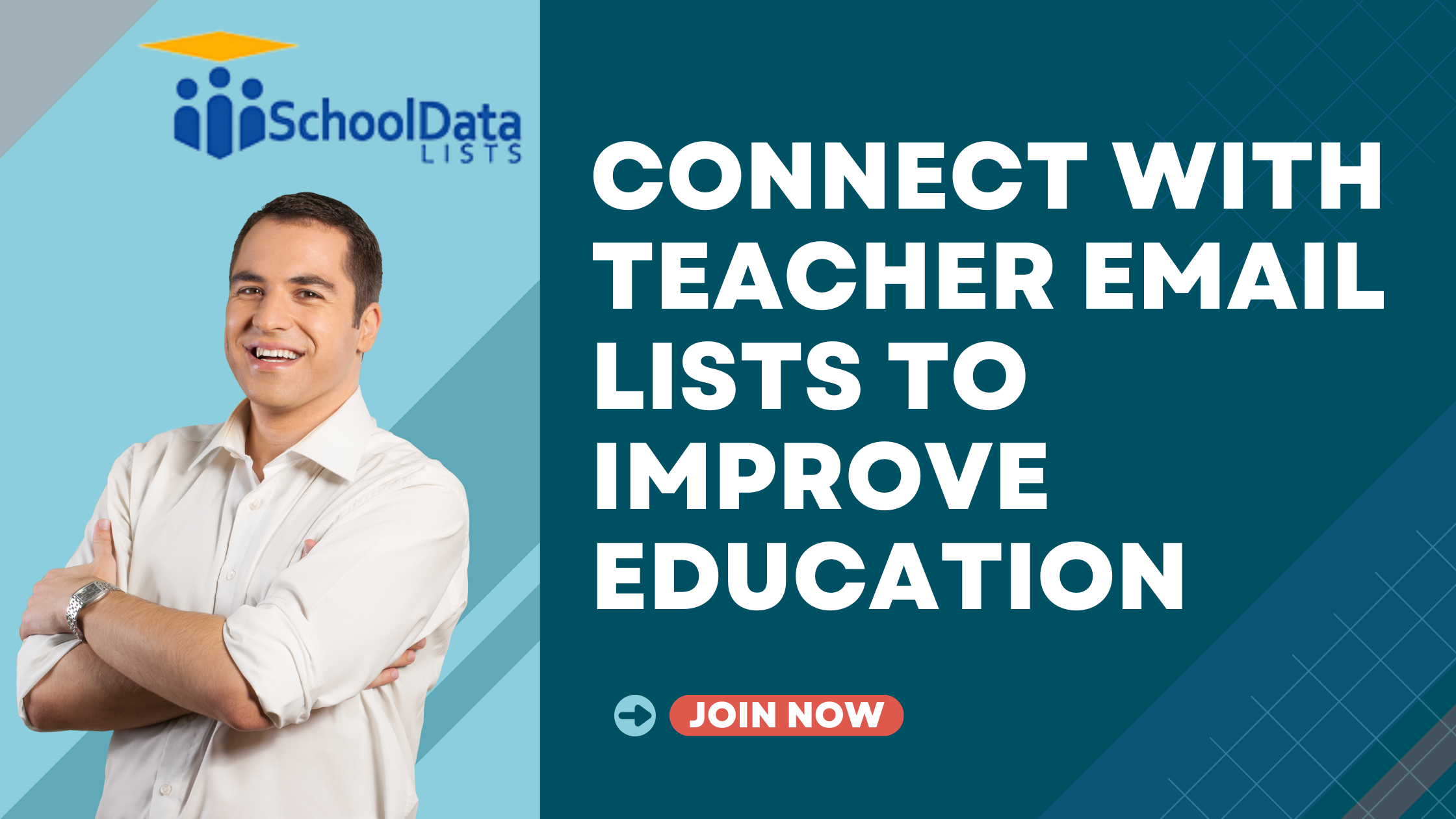Introduction
In the digital age, communication plays a pivotal role in enhancing the quality of education. One of the most effective ways to foster communication and collaboration among educators is through teacher email lists. These lists serve as invaluable platforms for sharing ideas, resources, and best practices among teachers. In this essay, we will explore the significance of connecting with teacher email lists to improve education. We will analyze the benefits of these email lists, examine their impact on professional development, and investigate how they contribute to creating a supportive community of educators. Moreover, we will delve into the challenges and potential solutions for maximizing the potential of teacher email lists to transform the realm of education.
Benefits of Teacher Email Lists
Teacher email lists have emerged as indispensable tools for educators to stay connected, share insights, and enhance their teaching methods. The benefits of teacher email lists are manifold and have a profound impact on education:
- Resource Sharing: Teacher email lists serve as digital repositories of valuable teaching materials, lesson plans, and innovative teaching strategies. Educators can share their successful classroom experiences, enabling others to learn from their best practices. This collaborative approach fosters a sense of camaraderie and professional growth among teachers.
- Professional Development: By connecting with teacher email lists, educators gain access to a vast network of like-minded professionals who are passionate about improving education. This network provides opportunities for continuous learning and professional development through webinars, workshops, and seminars. Exposure to diverse perspectives enhances teachers’ knowledge and helps them refine their teaching techniques.
- Community Building: Teacher email lists create a strong sense of community among educators. They encourage discussion, dialogue, and feedback, thus promoting a culture of openness and mutual support. In times of challenges, this community becomes a source of inspiration and motivation for teachers, keeping them resilient and dedicated to their profession.
- Innovative Ideas: The collaboration facilitated by teacher email lists often leads to the generation of innovative ideas. Educators from different backgrounds and experiences come together to brainstorm and solve common educational issues. This collective wisdom leads to the development of groundbreaking educational approaches that benefit both teachers and students.
- Global Perspectives: Teacher email lists transcend geographical boundaries, enabling educators from different parts of the world to connect. This global perspective enriches discussions, exposes teachers to diverse educational systems, and fosters cross-cultural understanding. Such interactions empower educators to adopt best practices from different regions, elevating the overall quality of education.
- Timely Updates: In the fast-paced world of education, staying updated on the latest trends, policies, and technologies is crucial. Teacher email lists provide a platform for disseminating timely updates on educational advancements, ensuring that educators remain well-informed and adaptable to changes.
Impact on Professional Development
Effective professional development is the cornerstone of improved education outcomes. Teacher email lists play a vital role in nurturing professional development by offering a range of opportunities:
- Sharing Experiences: When educators connect with teacher email lists, they gain the ability to share their experiences with a broader audience. They can present their success stories, challenges faced, and strategies implemented to overcome them. This sharing of experiences encourages reflection and introspection, allowing teachers to refine their instructional practices continually.
- Peer Learning: Peer learning is a powerful mechanism for professional growth. Through teacher email lists, educators can engage in peer-to-peer discussions, exchanging insights and ideas. This collaborative learning approach fosters a culture of continuous improvement and encourages teachers to explore new methods and techniques.
- Access to Experts: Teacher email lists often feature experts and thought leaders in the field of education. By participating in discussions and webinars conducted by these experts, educators gain valuable insights and perspectives. Interacting with renowned professionals helps teachers broaden their horizons and embrace innovative pedagogical approaches.
- Self-Paced Learning: One of the key advantages of teacher email lists is the flexibility they offer in terms of learning. Educators can access resources and engage in discussions at their convenience, fitting professional development into their busy schedules. This self-paced learning model ensures that teachers can absorb knowledge without feeling overwhelmed.
- Building a Portfolio: As educators engage with teacher email lists, they contribute to discussions, share resources, and showcase their expertise. Over time, this creates a digital portfolio of their contributions to the educational community. This portfolio can be a valuable asset in career advancement and recognition within the teaching profession.
Creating a Supportive Community of Educators
Education thrives in a supportive and collaborative environment. Teacher email lists provide a platform for creating such a community, which has a host of positive impacts on educators:
- Mentorship Opportunities: Within the online community of educators formed by teacher email lists, experienced teachers can act as mentors for their less experienced peers. This mentorship helps novice teachers navigate the challenges of their early careers, receive guidance, and develop their teaching skills effectively.
- Promoting Inclusivity: Teacher email lists can be structured to include educators from diverse backgrounds, catering to a wide range of perspectives and experiences. This inclusivity fosters an understanding of different teaching contexts and student demographics, making education more adaptable and relevant.
- Collaborative Projects: The connections formed on teacher email lists can extend beyond virtual discussions. Educators can collaborate on joint projects, and research initiatives, or even create interdisciplinary learning opportunities for their students. These collaborations enrich the educational experience for both teachers and students.
- Support during Crises: In times of crises, such as the COVID-19 pandemic, teacher email lists proved to be invaluable in maintaining continuity in education. Educators shared strategies for online teaching, digital resources, and emotional support, helping each other navigate the challenges of remote learning.
- Professional Advocacy: A supportive community of educators formed through teacher email lists can become a powerful voice in advocating for policy changes and educational reforms. This collective advocacy ensures that the concerns and suggestions of educators are represented in discussions about the future of education.
Challenges and Solutions
While teacher email lists offer numerous advantages, they also come with certain challenges. It is essential to address these challenges to maximize the potential of these platforms in improving education:
- Information Overload: With the wealth of information available on teacher email lists, educators may feel overwhelmed and find it challenging to prioritize what to engage with. To address this issue, platforms can introduce content curation mechanisms and personalized recommendations based on educators’ interests and needs.
- Ensuring Inclusivity: It is crucial to ensure that teacher email lists are inclusive and representative of diverse perspectives. Platform administrators can actively encourage participation from educators of different backgrounds and actively moderate discussions to prevent any biases or discriminatory behavior.
- Data Privacy and Security: Teacher email lists deal with sensitive educational data and personal information. Platform providers must prioritize data privacy and security, implementing robust measures to safeguard users’ data and adhere to relevant regulations.
- Balancing Online and Offline Interaction: While teacher email lists facilitate online interactions, it is essential to strike a balance with face-to-face interactions. Educators should be encouraged to implement the knowledge gained from these platforms in their classrooms and engage in local professional development activities.
- Avoiding Echo Chambers: To maximize the benefits of teacher email lists, it is crucial to foster an environment that encourages critical thinking and constructive debates. Administrators can promote diverse viewpoints, discourage echo chambers, and facilitate healthy discussions that challenge preconceived notions.
Conclusion
Connecting with teacher email lists has proven to be a game-changer in the realm of education. The benefits they offer, such as resource sharing, professional development, and community building, empower educators to create a positive and transformative impact on students’ lives. These platforms promote collaboration, inclusivity, and the exchange of innovative ideas, making them indispensable tools for teachers seeking continuous improvement in their practice.
Nevertheless, challenges exist, including information overload, data privacy concerns, and the risk of echo chambers. By addressing these challenges proactively and implementing relevant solutions, we can harness the full potential of teacher email lists in shaping the future of education.
Author Bio:
James Mary is an accomplished marketing strategist at SchoolDataLists, a leading provider of comprehensive education industry data solutions. With a passion for driving growth and enhancing brand visibility, Lisa leverages her expertise to develop innovative marketing strategies tailored to the unique needs of the education sector.
His extensive knowledge of market trends and consumer behavior allows her to identify key opportunities and create targeted campaigns that resonate with educators, administrators, and decision-makers.
James exceptional communication skills and analytical mindset enable her to collaborate effectively with cross-functional teams, ensuring the successful implementation of marketing initiatives. With a track record of delivering measurable results, Lisa is committed to helping educational organizations thrive in a competitive landscape by leveraging data-driven insights and cutting-edge marketing techniques.





